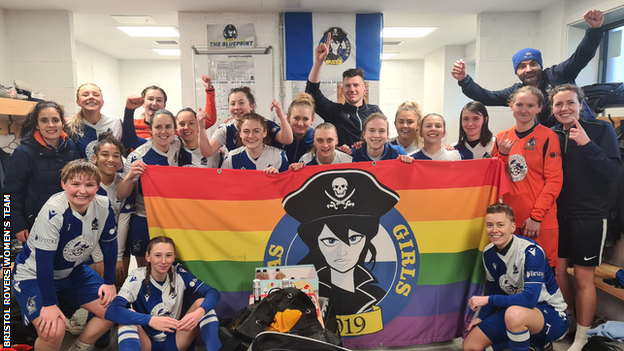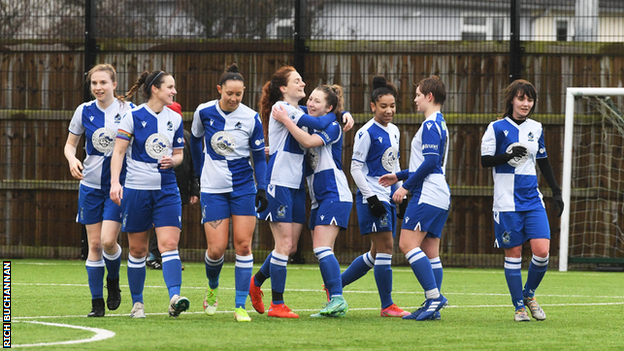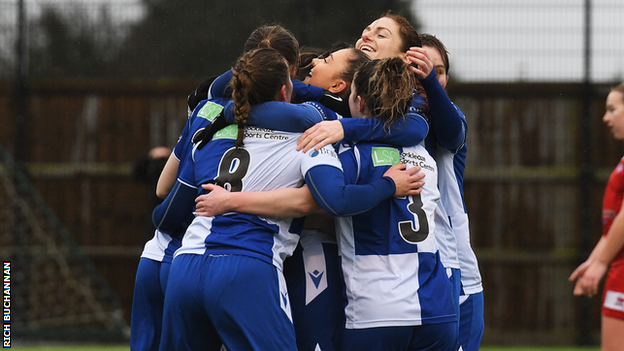Bristol Rovers women: Gas Girls celebrate back-to-back promotions
- Published

Bristol Rovers Gas Girls celebrated a second consecutive promotion after their league title was confirmed
Bristol Rovers Women's co-founder says he wants to continue inspiring women into the sport, after securing a second promotion only three years after their relaunch.
Rovers had been without a dedicated women's team since 2005.
The idea to restart the Gas Girls came in 2019 from the Community Trust associated with the men's club.
They have just secured back-to-back promotions and will play in the fifth tier of women's football next season.
"To give girls that opportunity to be involved in the industry is massive," said team co-founder Matt Davies.
"If we can help provide those opportunities and those inspirations to girls going forward, who believe, 'I can work in the football industry'."
The original Bristol Rovers Women's team was formed in the 1980s, but in 2005 it became the Bristol Academy WFC and then Bristol City Women's Football Club in 2015. Now associated with Rovers' cross-city rivals, the Robins' team plays in the Women's Championship.
In 2019, Davis and Nathan Hallett-Young - also now the team manager - had the idea of relaunching a women's team. That summer a recruitment drive for players began, with the senior team entered into the Gloucestershire County Women's Football League the following season.
A development squad featuring under-18 players was also set up - players are consistently encouraged to come along for trials and to train - while the team has provided more of a platform to the sports degrees and courses offered through the Community Trust.
Local campaigns have also been supported, with special kits created to support Bristol Pride and Her Game Too, a campaign to tackle sexism in football.

Bristol Rovers' Gas Girls beat Weston Mendip 4-0 to secure their promotion
"From day one we always said we wanted to be more than just a football team," Davis said.
"We work in four areas, or four corners if you like, that's community, education, participation and performance.
"I feel that if we can keep working in those four areas, specifically to offer women and girls the opportunity to be educated, to play, to support and be a part of the performance side of the football - going through the leagues and being competitive - then I think we're on the right track."
Three dominant seasons
The Gas Girls were unbeaten and on the verge of securing the league title in their inaugural year when the coronavirus pandemic cut the season short, and it was ruled null and void.
They returned last year to wrap up promotion and backed it up this year with a dominant season, winning 13 of their 15 league matches to move up from the South West Regional Women's League's Northern Division to its Premier Division.
Rovers captain Natalie Coles said it had been "an incredible three years".
"Being 32 myself, when I was younger there was not this much interest that there is now and it's done a lot for the club and for women's football," she said.
While vice-captain Libby Bell said: "With the right recruitment we can definitely go a lot further."
Hallett-Young said the team's results had just "snowballed" from the start of the season.
"We were never expecting to come in straight away and win the title after last season but delighted that we got to that point and we are over the line now."
As an amateur team, everyone working with the Gas Girls does so as a volunteer, although the association with the men's team has benefits, in terms of sharing knowledge and helping give them a profile.
"The badge is always going to be something that's prevalent in this. Without that attachment to a professional football club I don't think we have the pulling power of the players we've brought in," Hallett-Young said.
"It's trying to bring people on board and make sure that everyone's involved and singing from the same hymn sheet."

The Gas Girls won 13 of 15 league matches to secure the title on Saturday
The success on the pitch has had knock-on effects off it, with more women and girls participating in football through the team, more applying for football-related courses through their education programmes, as well as more fans watching the matches and engaging online.
The aim now for the Gas Girls is to push towards the FA Women's National League, which covers the third and fourth tiers of the women's game.
"Like every team we want to win games and we want to progress but it's massively important, especially in the women's game, with the way things are going," Davis said.
"If you invest time and the effort early on into what your club stands for then you're going to reap the benefits in the future.
"I still think we're scratching the surface and I'm excited by the future."